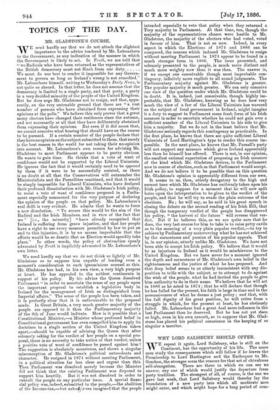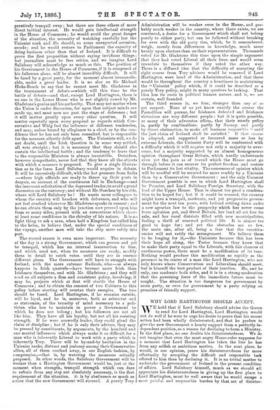WHY LORD SALISBURY SHOULD OFFER.
Wki repeat it again, Lord Salisbury, who is still on the Continent, has the opportunity of his life. The more men study the consequences which will follow if he leaves the Premiership to Lord Hartington and the Exchequer to Mr. Goschen, the stronger seem the reasons for that act of chivalrous self-abnegation. There are three to which we can see no answer, any one of which would justify the departure from party tradition. The strongest of all, of course, is the one we gave last week, that Lord Salisbury would thereby lay the foundation of a new party into which all moderate men might enter, and which might hope for a long period of corn-
paratively tranquil sway ; but there are three others of more direct tactical interest. He would gain intellectual strength in the House of Commons ; he would avoid the great danger of the situation, the necessity of watching carefully lest the Unionist rank and file should, on some unexpected occasion, secede ; and he would restore to Parliament the capacity of doing business other than that of Ireland. It is difficult to prove the first proposition without saying invidious things ; but journalists must be free critics, and we imagine Lord Salisbury will acknowledge as much as this. The position of his Government in the House of Commons, if it is composed of his followers alone, will be almost incredibly difficult. It will be faced by a great party, for the moment almost irreconcile- able, under a great leader. It is no slur on Sir Michael Hicks-Beach to say that he cannot meet Mr. Gladstone in the tournament of debate—which will this time be the battle of debate—and that, except Lord Harlington, there is no one in the Lower House who is not slightly cowed by Mr. Gladstone's genius and his authority. That may not matter when the Union is under discussion, for upon that subject minds are made up, and most men are past the stage of deference ; but it will matter greatly upon every other question. It will matter especially upon every proposal as regards which Con- servative and Whig feel the influence of different tendencies, and may, unless bound by allegiance to a chief, or by the con- fidence that he has not only been consulted, but is responsible for the measure, silently drift apart. The Unionists will, we do not doubt, until the Irish Question is in some way settled, all vote straight ; but it is necessary that they should also sustain the intellectual battle ; and the tendency to leave that to the responsible Ministers is always irresistible. Outsiders, however sympathetic, never feel that they know all the objects with which a measure is proposed. To give a single illustra- tion as to the force Lord Salisbury would acquire in debate. It will be excessively difficult, with the hot pressure from India —where high officials are ready to throw up their posts in despair, on account of the continuous fall in Exchange—and the incessant solicitation of the depressed trades, to avoid a grand discussion on the currency ; and without Mr. Goschen by his side, where will Lord Salisbury be ? He wants more colleagues to whom the country will hearken with deference, and who will not feel crushed whenever Mr. Gladstone speaks in earnest ; and he can obtain them only by the junction now pressed upon him from so many sides, pressed with an earnestness which shows at least some confidence in the chivalry of his nature. It is no light thing to ask a man, when half a Kingdom has called him to the helm, to believe that, under the special conditions of the voyage, another man will take the ship more safely into port.
The second reason is even more important. The necessity of the day is a strong Government, which can govern and yet be tranquil, which has no internal insurrection to fear, and which need not, when its measures are ready, modify them in detail to catch votes, until they are in essence different plans. The Government will have to struggle with Ireland, with the more extreme Radicals, who—as always happens in Irish quarrels—have become more Irish than Irishmen themselves, and with Mr. Gladstone ; and they will need on all subjects a firm and consistent policy, involving, it may be, projects which at first will startle the House of Commons ; and to obtain the consent of two Cabinets to this policy before starting will overtax their energies. The two should be fused. Lord Harlington, if he remains outside, will be loyal, and he is, moreover, both as aristocrat and as statesman, of the tenacity of mind necessary to a poli- tician who has to maintain in power a Government to which he does not belong ; but his followers are not all like him. They have all his loyalty, but not all his resisting strength. If he were avowedly leader, they could plead the claim of discipline ; but if he is only their adviser, they may be pressed by constituents, by arguments, by the hundred and one mental influences which always make it so difficult for a man who is inherently Liberal to work with a party which is inherently Tory. There will be by-and-by hesitation in the Unionist ranks, distrust and jealousy among their Conservative allies, all of them soothed away, in our English fashion, by compromise,—that is, by watering the measures actually proposed. In other words, the Salisbury Government will be weaker than a Hartington Government would be, just at the moment when strength, tranquil strength which can dare to refrain from any step not absolutely necessary, is the first requirement of the situation, it is by abstinence as much as action that the new Government will succeed. A purely Tory
•
Administration will be weaker even in the House, and pro- bably much weaker in the country, where there exists, we are convinced, a desire for a Government which shall not belong purely to either party, but can be followed without breaking for ever with the old party ties, which, be it remembered, weigh, merely from differences in knowledge, much more keenly upon electors than on their representatives. Thousands voted for Mr. Gladstone this time upon the simple argument that they had voted Liberal all their lives, and would seem irresolute to themselves if they voted the other way. There is a diffused idea that the difficulty of accepting the right course from Tory advisers would be removed if Lord Hartington were head of the Administration, and that there would be throughout the country a heartiness in maintaining the " Unionist " policy which, if it could be described as a purely Tory policy, might in many quarters be lacking. That idea has its roots in political human nature, and is, we are certain, well founded.
The third reason is, we fear, stronger than any of us yet suspect. None of us yet know exactly the course the Parnellites will pursue, for Irishmen defeated and Irishmen victorious are very different people ; but it is quite possible, as many of their advocates affirm, that their steady policy is, partly by combinations, partly by fluency, and partly by direct obstruction, to make all business impossible "until the just claim of Ireland shall be satisfied." If that course is adopted, and supported or favoured more or less by extreme Liberals, the Unionist Party will be confronted with a difficulty which it will require not only a majority to over- come, but a majority supported by an almost homogeneous opinion throughout Great Britain, which hardly understands even yet the pain as of travail which the House must go through before it can recover its perfect freedom and restore to Parliament its lost vitality. The consensus of opinion which will be needful will be secured far more readily by a Unionist than by a Conservative Government ; and the only Unionist Government possible is one in which Lord Hartington shall be Premier, and Lord Salisbury Foreign Secretary, with the lead of the Upper House. That is almost too good a combina- tion to be hoped for ; but if it could be secured, the country might have a tranquil, moderate, and yet progressive govern- ment for the next ten years, with Ireland settling down under a new agrarian law to the prosperity which has never come from agitation yet, and Great Britain, her land all set free for sale, and her rural districts filled with new municipalities, feeling a thrill of renewed political life It is almost too good to hope for ; and yet the obstacles are so few, the main one, after all, being a fear that the constitu- encies will not ratify the arrangement. We believe them to be longing for it,—the Unionists because this has been their hope all along, the Tories because they know that to make their party equal to the Liberals, with fair chances of continuous power, there must be a modification of its tone. Nothing would produce this modification so rapidly as the presence in its centre of a man like Lord Hartington, who not only knows where Conservatism and Liberalism should meet, but is himself the best product of their junction. He, and he only, can moderate both sides, and it is in a strong moderation that the governing force of the immediate future must be sought. The situation is too dangerous for government by mere party, or even for government by a party relying on promises of friendly support.



































 Previous page
Previous page